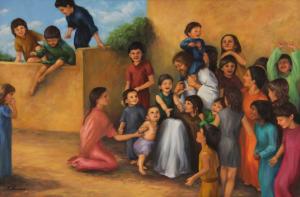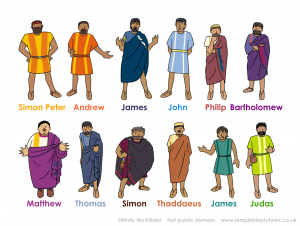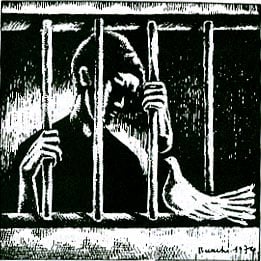
My catechism doesn’t say it, but being a Christian means that powers of the world will consider you a threat and possibly kill you. That’s the message in a series of lessons on rules Jesus enacts for his followers. It wasn’t strange religious beliefs that set Christians up for persecution but their revolutionary way of acting.
Sixteenth in a series on “The Worldly Spirituality of Mark’s Gospel” with help from Ched Myers’ Binding the Strongman: A Political Reading of Mark’s Story of Jesus. The Introduction and a Table of Contents are HERE.
A catechism for the Kingdom of God
Jesus and the disciples are “on the way,” a metaphor in Mark for the Christian life. They are going from Galilee, where the whole mission of Jesus started, to Jerusalem, where there is the cross, which awaits Jesus and all Christians.
On the way Jesus is teaching. Myers calls it a catechism in three lessons. Lesson One (see this post) was about the Cross, the danger that faces the Christian from the outside. You might call this external politics, or foreign relations, of the new Kingdom of God.
Lessons Two and Three (Mark 9:30-10:45), the subject of this post, will be about internal politics. What does the catechism say the Kingdom like, on the inside? It’s a way of life that poses an existential threat to the Powers that Be. The Powers cannot abide it and will use any means to eliminate it. To live this life is to live under the shadow of the cross.
I will be looking, as always in this series, at the Gospel of Mark with Myers’ help, but also standing on my own a little. I will place myself where Mark doesn’t go—the original Mark, I mean, without the conclusions added later after Chapter 16, verse 8. I’ll be with the confused, frightened, and remorseful apostles after Jesus’ death. I’ll be considering, as they must have, things they had to be sorry for.
Radical conversion is what the disciples need.
Typically one sees cowardice as the disciples’ chief vice. They all run away at the end; at least in Mark’s Gospel all of them do. They’re sorry about that later. But I’m thinking their guilt includes much more active sins. There are sins of strength as well as of weakness.
The disciples need a conversion experience, and it isn’t just a matter of getting braver. It’s the sort of thing where everything changes, like what Jesus calls for when he says, “Repent and believe in the gospel.” This repentance, this metanoia, is much more than sorrow for sin. It’s a change in outlook, in worldview, a new vision. The disciples need to see that their old vision of the world participated in the very thing that put Jesus to death.
The old way of thinking
An old, ordinary, and everywhere assumed worldview was working in the disciples. It comes through in their sins of deed, word, and thought. Jesus exposes them throughout these lessons of the Catechism.
- Deeds: They try to stop someone from casting out devils “because he does not follow us.” (9:38). They tried to keep children away from Jesus. (10:13)
- Words and thoughts: They argue about which of them was the greatest. (9:34) Some vie for positions of power in Jesus’ reign; others become indignant at those who did. (10:3741)
- Thoughts: They question Jesus’ radical teaching about marriage. (10:10) and are astonished at Jesus’ teaching about wealth. (10:26)
Notice that some of these sins are against both outsiders (the exorcist) and insiders (the children). It doesn’t make any difference to Jesus. Here are some thoughts about some of the “sins.”
Deeds of discrimination against children
I used to think that the episode with the children coming to Jesus showed the disciples’ concern for Jesus, misplaced but sincere. Jesus must have been tired and hardly ready for a mob of boisterous kids. The disciples merely wanted to let Jesus rest. But the text doesn’t say anything like that.
More probably the disciples thought about children the way everybody in the first-century Mediterranean world did. Children were the lowest on the hierarchical chain of being. In the apostles’ minds children were unworthy of associating with the great master. But Jesus is on the children’s side just as he has been with the tax collectors and “sinners” and all the rest of the marginalized people in first-century Palestine.
Let the children come to me; do not prevent them, for the kingdom of God belongs to such as these. (Mark 10:14)
Words and thoughts about climbing the ladder of ambition
Two disciples, James and John, are angling for the best positions in Jesus’ coming reign.
Grant that in your glory we may sit one at your right hand and the other at your left. (Mark 10:37)
But every disciple is guilty of desiring it. They have all been arguing about which is the greatest. And the reaction to James and John is telling.
When the ten heard this, they became indignant at James and John. (Mark 10:41)
Not just disapproving. There seems to be a touch of anger that James and John are trying to upstage them. I’m imagining also a sense of relief that only James and John get the dressing down that all of them deserve.
Traditional thinking about marriage and money
The disciples’ reactions to Jesus’ teachings about marriage and wealth stem from a sinful pattern of thinking. Their ideas about marriage follow traditions that were patriarchal and demeaning of women. Their ideas about wealth are part of the symbol system that supports the status quo and keeps poor people poor.
Marriage. Jesus’ teaching about marriage is more radical than just “What God has joined together no human being must separate.” (Mark 10:9) It is not just a condemnation of divorce, which had been permitted by the Mosaic law. Jesus condemns the fact that men can get a divorce (rather easily it seems) but women can not. Jesus condemns the tradition that the sin of adultery with a married women is a sin against the woman’s husband but the same does not apply in reverse against a man’s wife.
Whoever divorces his wife and marries another commits adultery against her.” (Mark 10:11 emphasis added)
Jesus accepts the common fact of divorce (though he disapproves) and then adds the possibility of a woman as the one who divorces:
… and if she divorces her husband and marries another, she commits adultery.” (Mark 10:12).
Jesus condemns a man’s and a woman’s adultery equally.
Wealth. Like the disciples we are incredulous at Jesus’ teaching about wealth:
“It is easier for a camel to pass through the eye of a needle than for one who is rich to enter the kingdom of God.” (Mark10:25)
As a high school student in the 1960’s, I learned to interpret this parable quite conveniently. The needle’s eye becomes a gate to the city of Jerusalem that a camel could get through only by crawling on its knees. And that’s about how hard it is for us rich folks to get into heaven. In other words, we can do it if we just get down on our knees.
Someone in the Middle Ages thought that one up, and it’s been comforting rich people ever since. That couldn’t have been what Jesus meant to say to the rich man who asked him how he could inherit eternal life. If that’s what Jesus meant, the man wouldn’t have gone away with fallen face. (Mark10:22)
What Jesus asks of the rich man is to give his possessions to the poor. If that statement needs interpreting for today, it goes something like this: Correct the economic conditions that cause some people to be extraordinarily rich and others mired in poverty that they can’t escape. Christian communities in the first century actually tried to do that.
A dangerous catechism
The house rules that Jesus establishes for the Kingdom of God depart from practically all that contemporary society considers right and good and necessary. Imagine how this would go over in the halls of power:
Whoever wishes to be great among you will be your servant; whoever wishes to be first among you will be the slave of all. (Mark 10:43-44)
Communities like Mark’s are an embarrassment and a threat. It’s easy to see why Mark puts this catechism “on the way” to Jerusalem and the cross.
Image credit: Catholic World Art












